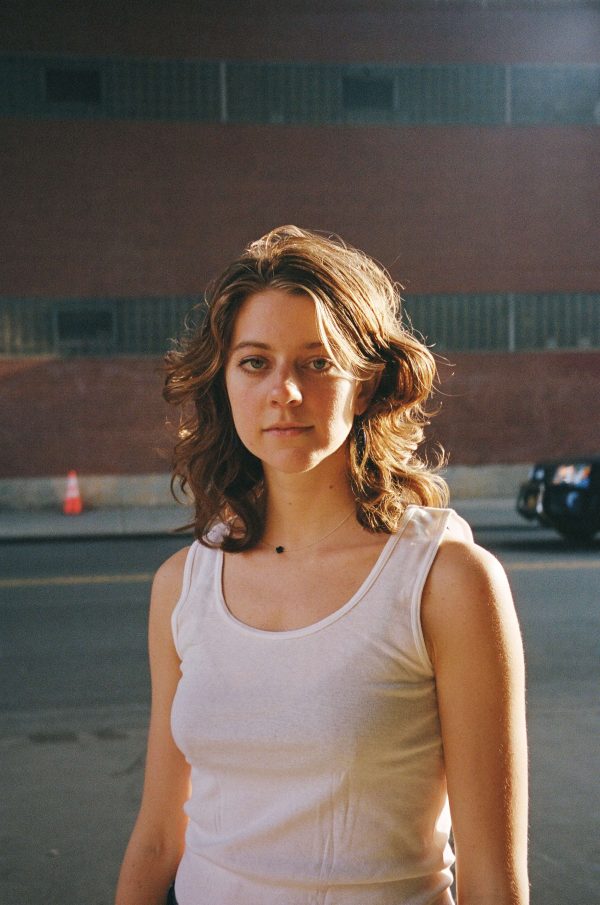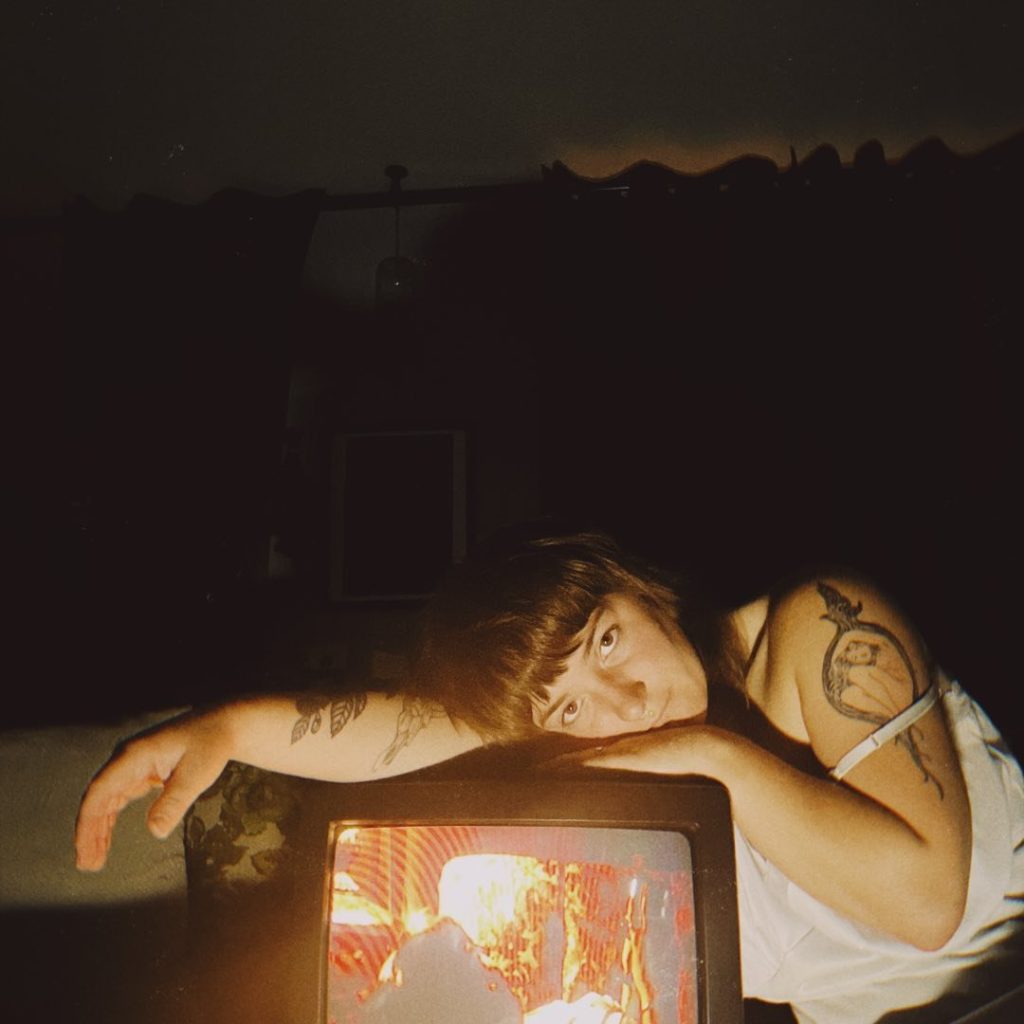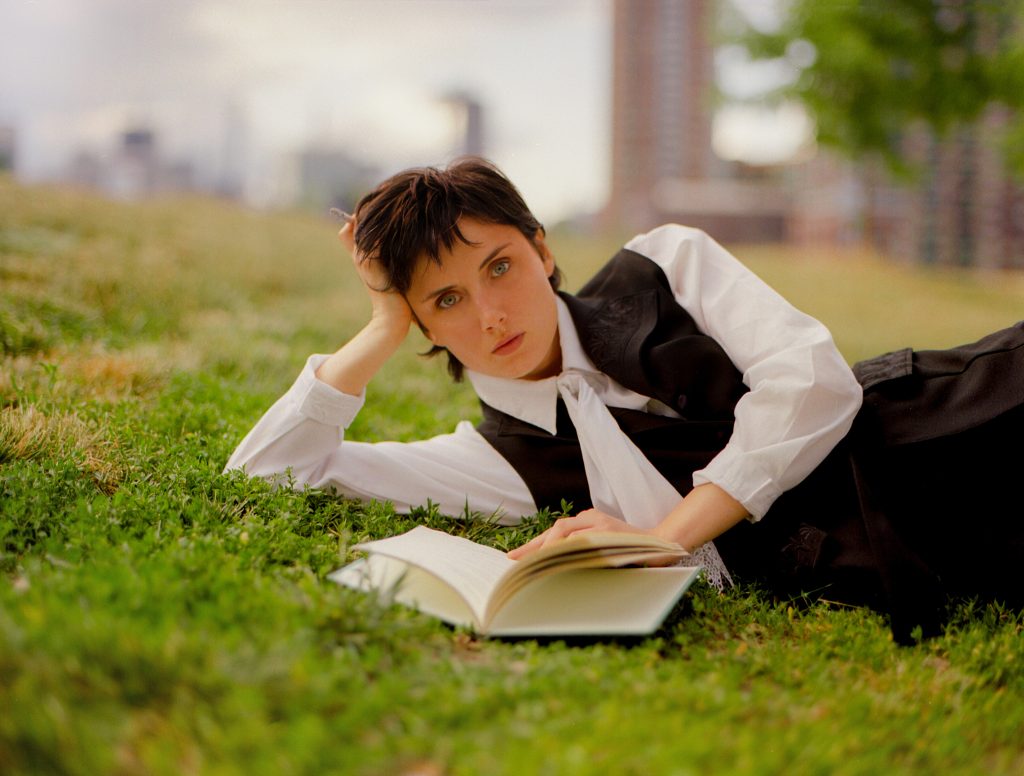
Let’s face it: There’s no such thing as “real life”. There is only experience and
the negotiations we undertake in order to share it with other people. On her second
album Blue Raspberry, the New York-based songwriter Katy Kirby dives headlong
into the artifice of intimacy: the glitter smeared across eyelid creases, the smiles
switched on with an electric buzz, the synthetic rose scent all over someone who’s
made herself smell nice just for you. An exegesis of Kirby’s first queer relationship,
Blue Raspberry traces the crescendo and collapse of new love, savoring each
gleaming shard of rock candy and broken glass along the way.
Originally from Spicewood, Texas, Kirby was living in Nashville when she
started writing Blue Raspberry’s title track, the first of the album’s songs to take
shape. “‘Blue Raspberry’ is the oldest song on the record. I began to write it a month
or so before I realized, I think I’m queer,” she says. “There’s a tradition of yearning in
country love songs. I like the male yearning songs better, usually. I started writing
‘Blue Raspberry,’ and I was thinking about, if I was in love with a woman, what would
I love about her? Especially if she was someone that I couldn’t touch, but that I was
pining for. What would I be caught on? And I thought that I would probably be
particularly charmed by the choices she made on how to look after she woke up in
the morning. I thought about tackiness, and the ways that’s a dirty word. That’s
where the title comes from — loving someone for those choices, for the artificiality.”
Blue Raspberry follows Kirby’s acclaimed debut album Cool Dry Place, which
was also recorded in Nashville and released in February of 2021. While the songs on
that record unfold amidst Kirby finding her voice, Blue Raspberry is a polished and
confident sophomore effort that deepens the questions that bubbled through Cool
Dry Place about how people can reach each other despite all the hazard zones
where human connection caves in.
After realizing that her romantic interest in women went beyond the confines
of a songwriting exercise, Kirby kept writing songs that sought to untangle that false
binary between the real and the fake, to celebrate the spectacles people put on for
each other when they’re falling in and out of love. She committed herself completely
to the work of drawing out these songs, often stealing away to her van to write
immediately after playing an opening set while on a 2021 tour with Waxahatchee. For
the first time since she started writing songs, Kirby stopped tamping down on her
impulse to craft ornate, generously embellished music. “I felt less embarrassed about
just wanting to write really gorgeous songs,” she says. She started weaving more
intricate chord progressions and melodies into her work, and in turn she felt
emboldened to hold onto the more baroque flourishes of her lyrics without whittling
them down into plainer lines.
Many of the songs that make up Blue Raspberry stemmed from a single page
of lyrical fragments, words and phrases that kept their hold on Kirby even as she
slipped them into multiple settings. Images repeat on different songs throughout the
album: cubic zirconia gleaming at a woman’s throat, the lab-grown substitute
indistinguishable from earth-crushed diamonds; salt crystallizing as seawater dries
on reddened skin; teeth that shine in a grin and then bite till they bruise. These
refrains and reprises lend a tight narrative cohesion to the record, elevating its sharp
queries into all the unlikely shapes love takes as it surges through you.
To underscore Blue Raspberry’s lyrical themes, Kirby worked with her band to
develop a newly lush sonic palette replete with orchestral gestures arranged by her
friend Rowen Merrill. “I felt like I was intending to write love songs for the first time.
Once I realized they were queer love songs and celebrating artificiality, I wanted
them to sound like they were bidding for a spot in the wedding reception canon,” she
says. “It was more fun to just go for it than to try to restrain ourselves. Especially if
we were just accepting the fact that we were trying to make objectively beautiful
music, whatever that means.”
Together with producers Alberto Sewald and Logan Chung, Kirby looked to
albums like Andy Shauf’s The Party and Lomelda’s Hannah as models for Blue
Raspberry’s abundant but spacious gorgeousness. Piano and strings echo together
on the gentle ballad “Salt Crystal,” while scrapes of cello punctuate each heartbroken
line of “Alexandria,” a song about the dissolution of Kirby’s first queer relationship
and recorded live in one take. Cymbals and organs stagger across the offbeat “Drop
Dead,” one of the album’s most playful songs that highlights the sly humor in Kirby’s
lyrics: “There’s no virgin territory for a body like hers.” On the album’s title track,
Kirby sings trailed by a pitch-lowered echo of her own voice, her guitar chords
hanging in the air like question marks. Her imagery seizes upon the bright, garish
colors of mass-produced material, homing in on its sensory intensity while casting
aside any judgment about its source. “Her eyes burn white as Styrofoam right into
me,” she sings, rendering a cheap, disposable substance into shocking magic.
“Why wouldn’t that be enough?” Kirby sings throughout the album, a
question that’s never answered and never drops. Every attempt at love strains
toward the idea of the real thing, that totalizing force that makes everything around it
perfect forever. But if no one ever gets there, why wouldn’t the straining itself suffice?
Blue Raspberry shivers with the idea that the key to the treasure is itself the treasure
— even if it’s plastic, even if its gold coating flakes off at your touch, even if despite all
your searching you never find the lock.

Allegra Krieger
“I Keep My Feet on the Fragile Plane” – Allegra Krieger’s fourth record and her first with Double Double Whammy – is her most mature and alluring work yet. It contains all the signatures of her best lyricism: delicate and precise phrasings, moments that flicker between beauty and banality, meaning that forms through the accretion of observations, memories, and unexpected adages. This is an album that is at once post-theistic and devoted to a relationship with the divine, each song blinking in and out of “the fragile plane,” a place Krieger describes as “a middle ground in the universe,” both abstract and peaceful, where time, bodies, and names don’t exist.
Krieger’s peripateticism has clearly informed her songwriting. She spent her childhood on the blistering beaches and cold Catholic pews of northern Florida. Before settling in Chinatown, she drifted through suburban Pennsylvania, North Carolina, Portugal, Italy, and Ireland cleaning motel rooms, planting trees, tending bars, and picking olives. In “Terribly Free”, she walks with the rats in Manhattan; in “I Wanted to Be” she bites into a ripe orange somewhere in the south; in “Nothing in This World Ever Stays Still” she stands outside of a sports bar in LA watching coastal smoke rise from the hills; later, she describes being “moved by whatever’s moving us.”
It’s with an almost deadly self-awareness that Krieger assembles a world in which people and places leave as quickly and easily as they arrive. “I never forgot,” she tells us in “I Wanted to Be,” “that as something grows something else must rot.” Yet Krieger doesn’t linger too long in honest exhaustion. Soon, she’s drinking coffee and watching a child dance across the street. Later “a brief but brilliant sun touches the hills” and she takes on the child’s inclinations, telling us, “if you feel like dancing, you must let it out, no room for question, no room for doubt.”
Krieger initially collaborated with Luke Temple and Jeremy Harris to record her vocals and guitar to tape at Panoramic Studios in West Marin, CA. As the album continued to form, Krieger envisioned instruments – like the French and English horn (Nancy Ranger and Priscilla Reinhart), electric guitar (Jacob Drab), and pedal steel (Kevin Copeland) – as characters which would walk in and out of the soundscape. What emerged from conversations with composer Sammy Weissberg, are brass parts that have a dark, almost surreal logic: horns arise to emphasize a word or phrase, fall out completely, only to rush back with dissonant orchestrations that gesture simultaneously toward deterioration and generation. Krieger herself plays pedal steel on “I Wanted to Be,” a song which was finished at Science is Magic Studios, and takes the form of an ouroboros: the chorus feeds into itself in a seemingly endless cycle before colliding into a rising clash of Krieger’s pedal steel and Drab’s electric guitar. While Krieger takes inspiration from Elliot Smith’s honesty, Judee Sill’s cosmic reaching, and Joni Mitchell’s sharp noticing, the dream-like association, harmonic dissonance, and angular melodic ascensions in each song are singularly and delightfully Krieger’s.
“I Keep My Feet on the Fragile Plane” is a daring collection of songs by an artist who scries with both the cold glass eye of truth and the beating heart of empathy; who portrays life in all its twisted complexities and in turn makes the felt and invisible, visible.

Makayla King
There is something innately human about making art. It soothes us, heals us, moves us. Like a jaw relaxing after a tense conversation, our souls relax into a sound, a color, a textile. I hope you dance and sway and find more of yourself as you listen. Because I believe that is the point of sharing: It creates a moment for us to remember ourselves again.



